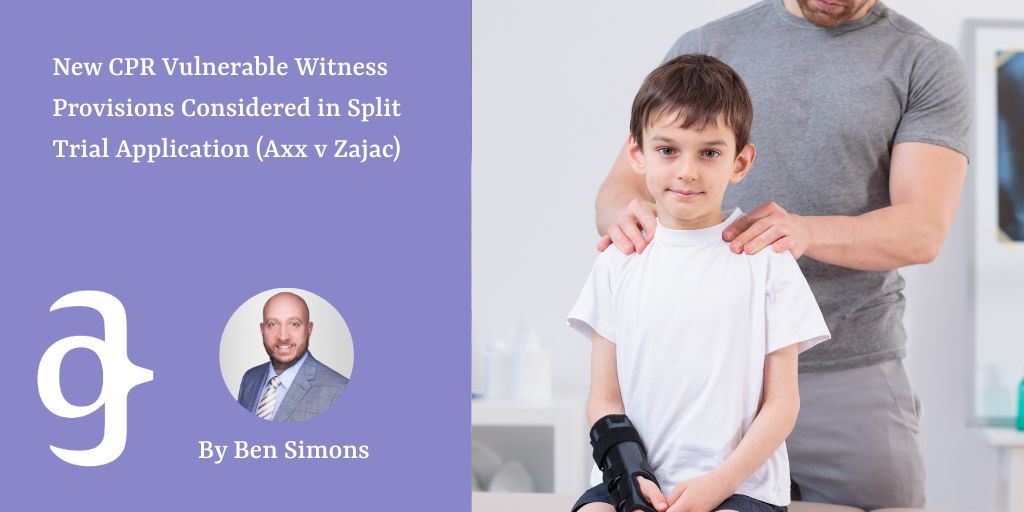New CPR Vulnerable Witness Provisions Considered in Split Trial Application (Axx v Zajac)

The Civil Procedure Rules (CPR) had been updated to address the issue of a vulnerable witness giving evidence to the Court, with the intention being to help vulnerable parties and witnesses to better cope with the litigation process and with giving evidence in a claim. The change came about as a result of the acknowledgement of the fact that if a witness or any other party to a claim is vulnerable in any way, this can adversely affect their ability to be a part of the proceedings effectively, which in turn can render their evidence far less reliable.
The intention of this amendment to the CPR was to try and negate this disadvantage to witnesses and other parties to a claim.
This update was subsequently addressed by Master McCloud in the case of AXX (a protected party by his litigation friend) v Zajac from 2022, in which Master McCloud applied the new provisions set out in CPR Practice Direction 1A in order to determine whether or not a split trial should be ordered in the case in which the claimant had alleged that they had suffered a significant and life-changing brain injury.
The Facts of the ‘AXX v Zajac’ Case
The claimant, a young boy, was injured in an accident when he was knocked off of his bicycle by a vehicle driven by the defendant. It was the Claimant’s case that he had suffered a brain injury in the accident which had caused him to suffer from neuropsychiatric symptoms which included psychosis, paranoia and delusions. He was in fact admitted to hospital under the Mental Health Act and was exhibiting some unusual behaviours and thought processes.
As part of the ongoing personal injury litigation, he had refused to be examined by medical experts instructed by the defendant.
The reason that this caused major difficulty in terms of case management was that the defendant was denying that the Claimant had suffered any severe brain injury as a consequence of the accident. In order to determine the causation of the brain injury, at a case management conference, the Claimant requested a split trial, but this was resisted by the Defendant.
It was the Claimant’s case that he should be regarded as a vulnerable witness to whom the provisions of CPR PD 1A applied, arguing that when considering the application, the court should have regard to CPR PD 1A, para 5 and in particular to sub-paragraph (c), in order to decide whether his vulnerability would adversely affect his ability to put forward his evidence to the court. The Claimant averred that if causation could be established in this way, he would then be able to apply to the Court for interim payments which would in turn enable him to have access to a much better standard of care.
The Court’s Determination
Master McCloud determined that there could be no disputing the fact that the Claimant had to be regarded as a vulnerable person as per the definition set out in CPR Practice Direction 1A, adding that the Claimant’s vulnerability would adversely affect his ability to participate in the case. Master McCloud recorded that the purpose of CPR PD 1A was to ensure that all Court hearings and the management of all cases were fair. She, therefore, accepted the Claimant’s argument that the provision in CPR PD1 A, paragraph 5(c) relating to putting evidence before the court was not restricted to the personal evidence of a party in a formal sense, but that it should also be interpreted to mean putting expert evidence before the court in the form of what is considered the best evidence.
This in turn would leave the Claimant feeling able to speak with the medical experts and answer all of their questions, all of which satisfied the Claimant’s rights under Article 6 of the European Convention on Human Rights, as well as the court’s equalities duties and the overriding objective.
Furthermore, Master McCloud agreed with the Claimant that by resolving the issue of causation at this stage in the Claimant’s favour, should that be the outcome, this would enable substantial interim payments to be made to the Claimant to enable him to have access to a much better standard of care going forwards, as well as rendering it more likely than not that the Claimant would take medication which had been recommended.
The conclusion reached by Master McCloud was therefore that a split trial would comply with the purpose of the provisions of CPR PD 1A and that this was in fact the very purpose as to why this provision was introduced and this would in turn ensure that the claimant was able to place his evidence before the court in his capacity as a vulnerable party.
The Intention of CPR Practice Direction 1A
CPR Practice Direction 1A places a duty on the court to take all reasonable and proportionate measures to consider whether a party or witness is vulnerable and may consequently struggle to participate in the proceedings and if they are, the duty then extends to ensuring that the Court addresses the specific needs and requirements of that vulnerable party or witness. This case is in fact one of the first reported instances in which the court has considered these new provisions regarding vulnerable parties or witnesses in the context of ongoing case management and this case will no doubt have a knock-on effect on many other similar cases as Master McCloud has now set a precedent on this issue.
CPR PD 1A now gives us clear guidance as to what must be considered on a case-by-case basis when determining whether a person is vulnerable, how it may affect their role in the ongoing claim process and what steps need to be taken in order to assist that party to actively participate in that process as far as is reasonably practicable. This judgment tells us that the provisions need to be read broadly, with an acceptance that, as in this particular case, they can be applied by the court when considering whether or not to order a split trial, where to do so would ensure that the vulnerable Claimant can put their evidence to the court in the best possible form and not be at any disadvantage by way of their vulnerability.
This judgment is a notable advancement in the rules regarding vulnerable parties and witnesses and it provides solicitors who are representing vulnerable clients or who will be calling upon a vulnerable witness to give evidence to the Court a way to assist them through the litigation process and to give their best evidence to the Court. This is very much a positive first reported example of the purpose of the amendment to the CPR last year in respect of vulnerable witnesses being used to good effect for the benefit of, in this case, a vulnerable Claimant.
Anthony Gold are specialists in claims for clients who have suffered a traumatic brain injury, spinal cord injury and other life-changing injuries. If you have suffered an accident and would like some advice on making a claim, please contact us at 020 7940 4000, email us at mail@anthonygold.co.uk or complete an online contact form which can be found on our website.
* Disclaimer: The information on the Anthony Gold website is for general information only and reflects the position at the date of publication. It does not constitute legal advice and should not be treated as such. It is provided without any representations or warranties, express or implied.*
No comments